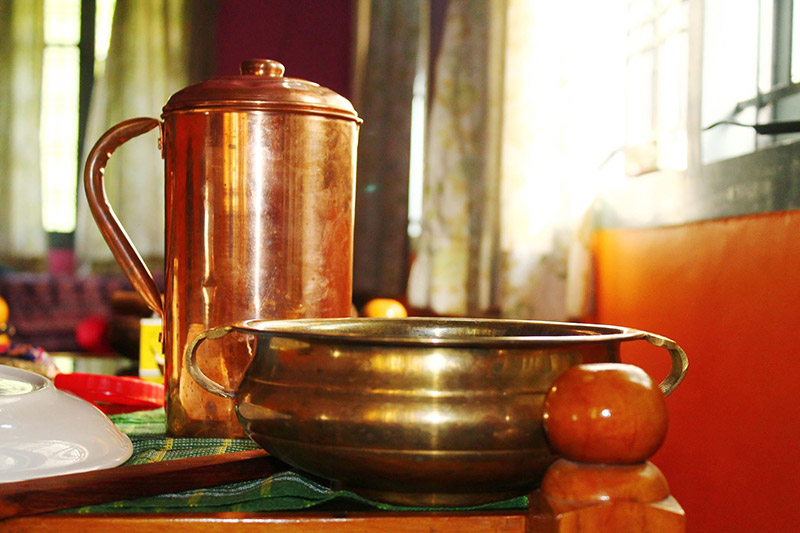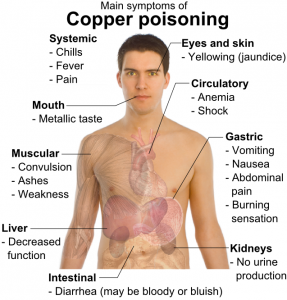3 Ways To Treat Copper Deficiency | Boost Collagen | Reverse Grey Hair

If you suffer from Copper Deficiency, or have some symptoms like Fatigue and Weakness; Problems With Memory and Learning or Difficulty Walking, why not give one of these 3 copper boosters a try to see if it can enhance your daily life? Adults should consume about 900 mcg of copper daily for good health.
1.) Store your drinking water in a copper vessel to purify the water and to charge it with copper, the Ayurveda way.
2.) With an all natural Ionic Copper mineral supplement, in the form of ionic copper ions of 0.9999 pure copper in pure deionized water.
3.) The old fashioned way by eating food that is high in copper.

Why You Need Copper In Your Diet
This often overlooked trace element can help you maintain a healthy and balanced life. Copper, together with iron, works to assist the body in forming red blood cells and collagen. A daily supplement of copper will also help keep the blood vessels, nerves, immune system, and bones in tip-top shape and even give you a boost of energy.
 Where Is The Copper Hiding?
Where Is The Copper Hiding?
Most copper in the body can be found in the brain, skeletal muscle, liver, heart, and the kidneys. These are also the areas that can be negatively affected in the case of copper poisoning, which can be prevented by taking frequent breaks in your daily copper regime.
9 Most Common Copper Deficiency Signs
- Fatigue and Weakness
Low copper results in low iron uptake. - Frequent Sickness
A lack of copper results in a bad immune system. - Weak and Brittle Bones
People with osteoporosis usually have lower levels of copper. - Memory and Learning Difficulty
Enzymes use copper to help supply energy to the brain - Difficulties Walking
Copper help enzymes to insulate the spinal cord, for signal relay between the brain and body. - Sensitivity to Cold
Together with other minerals like zinc, copper helps to maintain optimal thyroid gland function. - Pale Skin
Copper is used by enzymes that produce the pigment melanin. - Premature Gray Hair
Copper deficiency may cause premature gray hair due to the effect it has on melanin. - Vision Loss
Copper deficiency can cause problems with the nervous system, including vision loss

9 Ways How Copper Benefit Your Health
- Protects Cognitive Function
Sufficient amounts of copper in the body have been associated with advanced brain-thought processes, and the ability to absorb and process complex information. Who knows, maybe Nicola Tesla was on top of is copper game… - Promotes Immune Function
Copper deficiency has been linked to a reduction of white blood cells, so by taking copper, you will help build and maintain a supportive population of white blood cells in your body. Fighting infections are easy with the right knowledge and ingredients. - Copper for Bone Density
By taking copper your will be able to maintain healthy bone density, preventing the risk of developing osteoporosis and the agonizing side effects that come with it. - Arthritis Relief
Copper helps to strengthen the supportive structures of the muscular system and also assist in fighting inflammation. These two factors are paramount in fighting arthritis and will provide relief for those swollen joints, whilst it’s doing the job strengthening the muscles and structures. - Melanin Production
Melanin is the dark pigment that determines the color of your skin, and copper plays a vital role in the production thereof. People with lighter complections also have melanin in their skin, and will also benefit from taking copper to help their skin look more healthy. Copper helps the functioning of the essential enzyme, lysyl oxidase, which is required for the cross-linking of collagen and elastin, both essential for the formation of strong and flexible connective tissue. The Herbbalah bonus point goes to copper for its prevention of premature graying of the hair though! - Faster Skin Healing
Copper does a triple whammy on wounds with its anti-inflammatory, anti-bacterial and anti-viral properties. In supporting healthy cell renewal and rejuvenation, copper fights off potential infections and replace damaged skin all in one go. - Aids in Digestion
A healthy amount of copper in your diet can provide antibacterial properties which help the good bacteria in your gut fight off the bad bacteria. Not only will it help you maintain good gut flora, it can also help to heal ulcers. - Energy Booster
Your body synthesizes adenosine triphosphate, for the creation and transferring of energy, and you’ve guessed it, Copper is an element that plays part in the synthesis of the nucleotide ATP. - Protection Against Heart Disease
It is known that copper helps to lower triglyceride levels, which is not only good for your heart but also reduce the risk of fatty liver disease and pancreatitis. It can also help regulate blood pressure and prevent the buildup of plaque in the arteries.

How Much Copper Should You Use Daily?
Children
- 1 to 3 years: 340 mcg/day
- 4 to 8 years: 440 mcg/day
- 9 to 13 years: 700 mcg/day
Adolescents and adults
- Males and females age 14 to 18 years: 890 mcg/day
- Males and females age 19 and older: 900 mcg/day
- Pregnant females: 1,000 mcg/day
- Lactating females: 1,300 mcg/day
Option 1: Copper Vessel for Ayurveda Water
According to Ayurveda, a natural prevention-orientated holistic health system of India, drinking copper-enriched water in the morning on an empty stomach helps balance all three Doshas (Kapha, Vata and Pitta).
Store 2-3 glasses of water in a copper vessel overnight, and drink it first thing in the morning. (Do not drink more than 2-3 glasses a day). As water is stored in copper vessels, the copper gently leaches into the water and provides all its positive health benefits. The best part about this copper water is that it never becomes stale and can be stored this way for long periods of time.
This is the preferred way that we at Herbbalah like to keep our copper levels in check.
Option 2: Ionic Copper / Colloidal Copper
Microscopic molecules of copper are suspended in purified water when making colloidal copper supplements. When purchased, it comes in a liquid, extract-like form that is usually taken orally. According to manufacturing companies colloidal copper, it’s more digestible than other forms of copper. Supposedly, which makes the health benefits of copper much more effective.
Option 3: Copper Food Sources
|
Food item |
Contribution to individual copper consumption |
Daily copper contribution |
|
|
% |
mg |
|
Legumes |
30 |
0.36 |
|
Potato and potato products |
22 |
0.25 |
|
Nuts and seeds |
17 |
0.26 |
|
Beef |
16 |
0.17 |
|
Pasta and pasta dishes |
16 |
0.19 |
|
Ready-to-eat and hot cereals |
15 |
0.18 |
|
Rice |
14 |
0.16 |
|
Breads |
13 |
0.13 |
|
Ground beef |
13 |
0.12 |
|
Chocolate desserts |
12 |
0.14 |
|
Fruit juices |
11 |
0.11 |
|
Poultry |
11 |
0.11 |
|
Fish |
11 |
0.12 |
|
Dark green and deep yellow vegetables |
10 |
0.11 |
